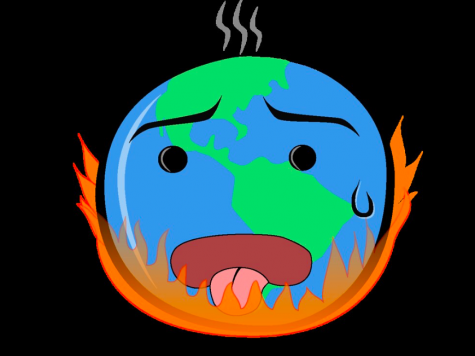Global Warming: Are we going to die?
March 30, 2020
 The ocean and the land is dying. Forests are burning. Sea levels are rising. There are more droughts and floods than ever. Temperature patterns are changing, and the weather is becoming more dangerous. Volcanoes, inactive for years, are erupting. Oceans worldwide are being contaminated. The very earth we inhabit has been warming up for years, and it is not something to be ignored.
The ocean and the land is dying. Forests are burning. Sea levels are rising. There are more droughts and floods than ever. Temperature patterns are changing, and the weather is becoming more dangerous. Volcanoes, inactive for years, are erupting. Oceans worldwide are being contaminated. The very earth we inhabit has been warming up for years, and it is not something to be ignored.
Global warming is the increase of the earth’s overall temperature, and is a great contribution to climate change. Climate change is ultimately an effect of rising global temperatures, as average weather patterns are changing.
Junior Frank Castro recognizes the significance of this phenomenon.
“I feel like global warming is important because we need the earth to survive. Due to global warming, we are taking steps backwards and we cannot reverse anything. It is way too late,” said Castro.
According to climate.gov, “The 2-degree increase in global average surface temperature that has occurred since the pre-industrial era (1880-1900) might seem small, but it means a significant increase in accumulated heat. That extra heat is driving regional and seasonal temperature extremes.”
There are several causes for the rise of global temperatures, and humans are one of the main contributions to climate change.
The greenhouse effect is the process where the sun warms the earth, and 90 percent of that energy is absorbed and reradiated as heat. Greenhouse gases, including water vapor, carbon dioxide, methane, nitrous oxide, and chlorofluorocarbons trap the heat and distribute it all around the world.
Financial literacy teacher, David Kimmel, believes that even eliminating greenhouse gases would not make much of a difference.
“Climate change is one of the biggest crises that needs to be solved in the 21st century,” said Kimmel. “Even if we were to cut off all greenhouse gas emissions, the earth will continue to warm up for years.”
NASA supports, “if we stopped emitting greenhouse gases today, global warming would continue to happen for at least several more decades, if not centuries. That’s because it takes a while for the planet (for example, the oceans) to respond, and because carbon dioxide – the predominant heat-trapping gas – lingers in the atmosphere for hundreds of years.”
Human activities also play a big role in global warming. The burning of fossil fuels such as coal and oil increases carbon dioxide and the additional greenhouse gases in the atmosphere. Other activities like deforestation and industry work are heating up the planet.
Effects:
All of this matters because global warming is creating various issues. Glaciers and ice on the earth are melting, causing sea levels to rise. Global warming is acidifying the ocean. Carbon dioxide turns into carbonic acid which is harming many sea animals. They depend on carbonate ions that CO2 diminishes. Companies are losing money from contaminated products, which are no longer safe for us to eat.
The arctic has had ice for nearly four million years. Due to global warming, scientists predict it will be ice-free in the near future.
Hurricanes will become a stronger threat to us.
Also, droughts and heat waves are foreseen. This will evaporate the water humans and animals depend on, making the disasters deadly in extreme cases.
Changed weather patterns combined with rising sea levels will increase flooding and lands will eventually sink.
Conflagrations are becoming more common, taking people’s homes away from them and killing a variety of animals that live in forests.
Rates of global warming and its effects are way higher than it was years ago. 2016 and 2019 are the two warmest years on record, according to NASA. Since the 19th century, the earth’s surface temperature has been increasing about 0.32 degrees fahrenheit every decade, ocean temperatures have risen 0.4 degrees fahrenheit, and the melting rate of ice has tripled. No one is sure what the ultimate effects of climate change are. If the Earth gets too hot, humans will be wiped out of existence.